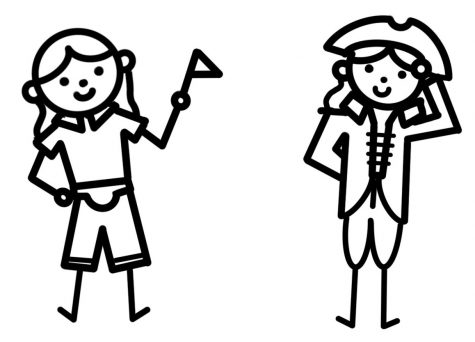Column: Sara’s Official Guide Through Music Genres – The British are Coming!
August 27, 2021

British Invasion is arguably the most influential music genre of all time. The Beatles, The Rolling Stones, The Kinks, and many others gained popularity through British Invasion.
This genre got its start in Britain during the late 1950s, when the post-World War II economy affected the production of musical equipment. America’s boom allowed them to make high end recording equipment, while Britain struggled to rebuild its economy. Imports from America to Britain were slow and didn’t include mixing boards which are essential in sound editing and recording. Music companies in Britain were then forced to make their own boards and amps as well as switch to condenser microphones as they could be easily bought from German manufacturers.
These changes in the equipment caused music made in Britain and other European countries to have a different sound than that of American creation.
The different tools used were not the only thing that set British Invasion apart from other music genres at the time. Rebellious blues sounds and rock and roll sounds of the United States were influencing the youth and artists of Britain. For a long time, American acts were popular in Britain, but Britain had yet to achieve success outside of their country, that was, until Beatlemania.
Beatlemania is a term coined in the 1960s recognized as the infatuation with The Beatles, an English rock band. The Beatles grew into such a huge platform that many American media outlets began reporting on this phenomenon. With their coverage extending overseas, The Beatles’ “I Want to Hold Your Hand” entered the February 1, 1964 edition of the Hot 100.
Over the next few years, more British acts ended up in the Hot 100 and 1965 brought a new wave of British Invasion artists. Most played as groups and either adopted a pop-like sound, as seen with the Zombies and the Hollies, or leaned more towards blues influence as seen with the iconic Rolling Stones.
The themes of the music genre touch on the freedom and rebellion that youth in the ’60s were yearning for.
As these bands rose to popularity and the rock sounds spread around the world, they became less affiliated with Britain, a dissociation which ended the “invasion” in the late 1960s
At the same time, however, the British Invasion not only introduced the world to artists and music in Britain, but it also bolstered the audience for British film and fashion industries. Films like Mary Poppins, My Fair Lady and even the James Bond series wouldn’t have done as well if the music hadn’t kickstarted Britain’s world domination. British Invasion also contributed to the rise of the hippie counterculture. Prior to the ’60s, conformity was expected and living a conservative life was considered the norm. After America was taken over by the counterculture, teens and young adults began dressing more casually and living more independently.
Beatlemania is not just a phenomenon of the ’60s, but a trend that has repeated through the decades. Modern British bands like One Direction and The Wanted dominated the charts in the 2010s with a similar gusto as the greats before them. I have no doubt that this trend will continue and provide us with more hits from the Brits.


